
Writ Not Maintainable Against Private Educational Institute If There Is No Public Law Element Involved: Supreme Court
 |
|The Supreme Court has observed that a writ petition against a private educational institute will be maintainable only if there is a public law element involved.
The Court pointed out that Individual wrongs or breach of mutual contracts without having any public element as its integral part cannot be rectified through a writ petition under Article 226.
The Bench of Justice Aniruddha Bose and Justice JB Pardiwala made this observation while dealing with an appeal against the decision of the Division Bench of the Madhya Pradesh High Court holding that a writ petition filed by an employee of a private unaided minority educational institution seeking to challenge his termination from service is maintainable in law.
The facts of the case are that an employee of a private unaided minority educational institution was terminated from service for alleged misconduct in service.
The terminated employee invoked the writ jurisdiction of the High Court under Article 226 of the Constitution. The appellant-institution raised a preliminary objection before the High Court on the maintainability of the writ petition filed by an employee of a private unaided minority institution.
The Single Judge of the High Court upheld the preliminary and rejected the writ application as not being maintainable.
However, the Division Bench of the High Court set aside the judgment and order passed by the single Judge and allowed the appeal holding that the writ application filed by the employee challenging the order of termination from service was maintainable under Article 226. The Court remitted the matter to the single Judge for being considered on merits.
Aggrieved, appellants approached Supreme Court.
Advocate Pai Amit appeared for the Appellants whereas the Respondent-employee appeared in-person.
At the outset, the Supreme Court noted that CBSE is only a society registered under the Societies Registration Act, 1860 and the school affiliated to it is not a creature of the statute and hence not a statutory body.
The Court further observed that power of judicial review under Article 226 can be exercised by the High Court even if the body against which an action is sought is not State or an Authority or an Instrumentality of the State but there must be a public element in the action complained of.
In the present case, the Court noted that the issue was with regard to the termination of service of the terminated employee which is basically a service contract.
"In the absence of any statutory provisions governing the services of the employees of the school, the service of the respondent no. 1 was purely contractual. A contract of personal service cannot be enforced specifically. Therefore, the respondent no. 1 cannot find a cause of action on any breach of the law, but only on the breach of the contract. That being so, the appellant's remedy lies elsewhere and in no case the writ is maintainable.", the Court held.
The Court placed reliance on a catena of cases and held that while a body may be discharging a public function and thus its actions beocme amenable to judicial review by a Constitutional Court. However, the Court pointed out that the employees of such body will not have the right to invoke the powers conferred by Article 226 in respect of matter relating to service where they are not governed or controlled by statutory provisions.
Therefore, the Court set aside the Decision passed by the Division Bench holding the writ petition as maintainable.
Cause Title- St. Mary's Education Society & Anr. v. Rajendra Prasad Bhargava & Ors.
Click here to read/download the Judgment